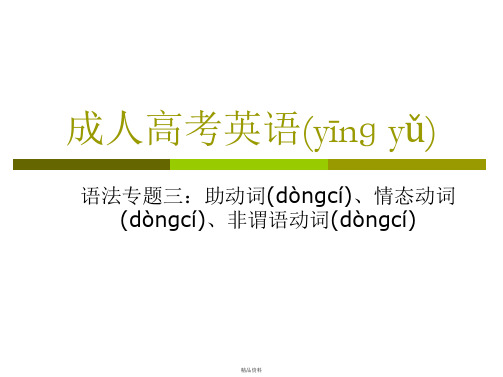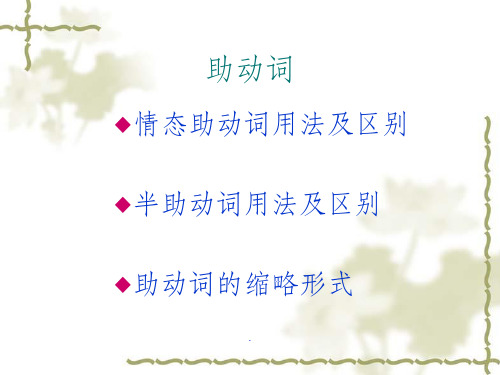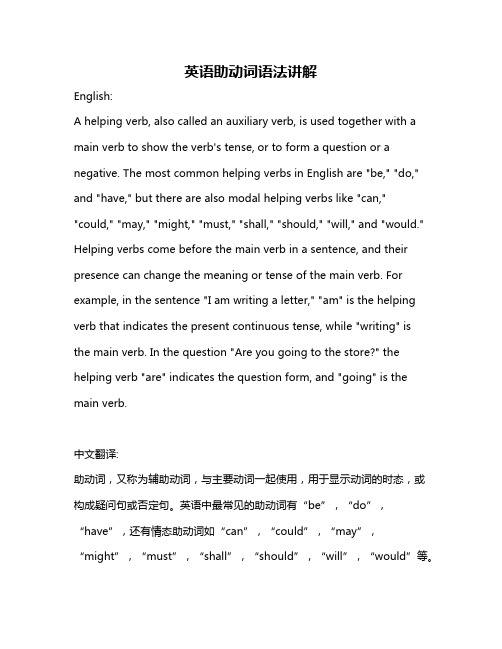英语语法助动词PPT课件
高中英语语法:动词和动词短语(共43张PPT)

一、动词
(2)表示感官的连系动词。这类动词主要有feel, smell, sound, taste等,它们没有被动语态。 This kind of cake tastes delicious.这种蛋糕尝起来很美味。 That sounds great.听起来妙极了。 (3)表示变化的连系动词。这类连系动词比较多,常见的有 become, grow, turn, fall, get, go, come, run等,主要用来表示主语 变化成什么情况。 Even quiet and serious scholars can become excited about it.甚至沉默 严肃的学者也能因其而激动。 The maple leaves turn red in autumn.枫叶在秋天变红了。
一、动词
高频考点: 表示“变成什么样子的人”常用become和turn,但是turn后作表 语的名词前不用冠词。 He wanted to become a writer but he turned journalist.他想成为一名 作家,但却成了一个记者。 (4)表示表象的连系动词。这类词主要有seem,appear,look等。 She used to smile all the time but now she looks washed out and unhappy.过去的她笑口常开,而现在的她看上去却缺乏活力,很不 开心。 He seemed disappointed when he was refused.被拒绝后他看起来很 失望。
一、动词
(5)表示终止的连系动词。这类词主要有prove, turn out等。 I imagined it would prove an easy task.我以为这会是一项容易的任务。 The medicine turned out highly effective.该药疗效显著。 (6)表示持续的连系动词。这类词主要有remain, keep, stay等。 He always keeps silent at the meeting.开会时他总是保持沉默。 3.助动词 助动词不能独立作谓语,必须和动词原形或分词构成复合谓语,表示实义 动词的时态、语态、语气、人称和数等。 (1)助动词be可以和过去分词构成被动语态,或与现在分词构成各种进行 时态。 History is made by the people.历史是人民创造的。 She is doing her homework now.她正在做家庭作业。
小学英语语法课件-系动词、实义动词和助动词 全国通用

Presentation Grammar Box
系动词be的句型结构
肯定句:主语+系动词be+其他 He is a police officer. 他是一名警察。
句 否定句:主语+be+not+其他 型
He is not a police officer. 他不是警察。
结 一般疑问句:Be+主语+其他? Is he a police officer?
Warm up
读一读,圈出句子中的动词 There is some ice on the car. We went to the zoo last year. She didn’t finish her homework. She plays ping pong every day. Lucy doesn’t want to be a football player.
小 学 英 语 语 法课件 -系动词 、实义 动词和 助动词 全 国 通用
Practice
Oral Practice
用所给词的适当形式填空,并朗读句子
My parents ___a_r_e___ (be) at home now, but they ___w_e_r_e__ (be) in the park just now.
构
他是警察吗?
特殊疑问句:
What is he?
特殊疑问词+be+主语+其他? 他是做什么的?
小 学 英 语 语 法课件 -系动词 、实义 动词和 助动词 全 国 通用
P实义动词和助动词的句型结构
肯定句: 主语+实义动词+其他 主语+助动词+动词形式+其他
成高辅导语法3-助动词、情态动词、非谓语动词

表示过去应该做某事而没做
精品资料
练 习: I was caught in a heavy rain. I __(_B_)__
1. —Where will you start your work after graduation, in the south or in the north?
— Mm, it’s not been decided yet. I __(_D_)__
continue my study for a higher degree.
— It _(_A_)_ be your younger brother. A. must B. shall C. will D. would
精品资料
例2:—Mom, do I have to go to bed now?
—Yes, you ___(D__). A. can B. will C. may D. must
意义: 情态动词时一种(yī zhǒnɡ)本身有一定词义,但
要与动词原形或其被动语态一起使用,给谓语动词 增添情态色彩,表示说话人对有关行为或事物的态 度和看法,认为其可能、应该或必要等。
精品资料
例1: — Who do you think has made my
room so dirty, mum?
-我应该把发生的事情(shì qing)告诉给班主任吗? -不行,你不能。李老师会非常生气
精品资料
3. Jim went to his hometown yesterday. He
英语语法--助动词ppt课件

❖注意:
❖ (1)may/might比较
表推测时,might比may更不. 确定。 表允许时,might比may更有礼貌。
❖ (2)might may can could比较 a) may和can表可观可能和允许时意义相同,但是也
不能随意互换。表可观可能时 ,may仅用于肯定 句而can可用于各种句式。
.
❖ (3)表允许用于非正式场合。
Can在肯定疑问句中表要求在否定句中表禁止。
You can smoke in the entrance hall. Can you lend me 2yuan? Could 用于这个意义时只用于疑问句,语气更加委婉。
Could you please fetch us a few cups? ❖ (4)表感情色彩。表某种情绪。 What can satisfied her?(不满) What else can you say?(不耐烦) How can I do such a thing ?(难办)
他有时会很骄傲
.
2 may与might
(1)表示可以做或可能发生的事 He may come soon. You may order a taxi by telephone.
Might用于间接引语;也表客观未实现的动作 He said he might order a taxi by telephone. 他说他可以用电话定出租车。 He might have fallen ill if he hadn’t take the medicine. 他如果没服药可能就病倒了 (2)表允许,多用于肯定句和疑问句,正式场合 You may take the book home。 .你可以把这本书带回家。 May I borrow your bicycle? 我可以借你的自行车吗? Might 表允许时比may更有礼貌。 Might I have a little brandy? . 我可以喝一点白兰地吗?
英语语法之助动词

时态
一般现在时 一般过去时 一般将来时
过去将来时 现在进行时 过去进行时 现在完成时 过去完成时 被动语态
结构
动词原形——do 动词三单——does 动词过去时——did
构成疑 问句和 否定句
will/shall+v.
is/am/ are going to +v.
work. 2)have + been +现在分词,构成完成进行时。
I have been studying English for ten years. 3)have+been +过去分词,构成完成式被动语态。
English has been taught in China for many years.
助动词do 的用法
1) 构成一般疑问句,例如: Do you want to pass the CET?
2) do + not 构成否定句,例如: I do not want to be criticized. 构成否定祈使句,例如: Don’t be so absent-minded.
* 构成否定祈使句只用do,不用did和 does。
do
--do/does/did
will
--will/shall/would/should
be
--am/is/are/was/were
have --have/has/had
1.be——am/is/are/was/were 1) be +现在分词=现在进行时
He is running. 2) be +过去分词=被动语态
3) 放在动词原形前,加强该动词的语气
I do miss you. 4) 代动词,例如:
初中英语语法-助动词-PPT课件-图文

1. I like swimming in the summer. (do ) 2. You want to go shopping in the evening. (do) 3. He goes to work by car every day. (does) 4. We need some rice for lunch. (do) 5. They know the answer to the question. (do) 6. He spent a day painting the house. (did)
句式变化: 肯定句 否定句
变化规则 1.看 主语 确人称 2.找 动词 确时态 3.借 助动词 助动词后加“not” 4.变 原型 ( 助动词后跟 动词原形)
1. I like swimming in the summer. 2. You want to go shopping in the evening. 3. He goes to work by car every day. 4. We need some rice for lunch. 5. They know the answer to the question. 6. He spent a day painting the house.
谢谢!
2. You don’t want to go shopping in the evening.
3. He doesn’t go to work by car every day.
4. We don’t need some rice for lunch.
1. I like swimming in the summer. (do ) 2. You want to go shopping in the evening. (do) 3. He goes to work by car every day. (does) 4. We need some rice for lunch. (do) 5. They know the answer to the question. (do) 6. He spent a day painting the house. (did)
英语语法详解:助动词

英语语法详解:助动词一.概念:助动词是协助主要动词构成各种时态,语态,语气以及否定或疑问结构的动词.助动词分为时态助动词和结构助动词两种.二.相关知识点精讲:1. 助动词be的用法1) be +现在分词,构成实行时态。
例如:They are having a meeting. 他们正在开会。
English is becoming more and more important. 英语现在越来越重要。
2)be + 过去分词,构成被动语态。
例如:The window was broken by Tom.. 窗户是汤姆打碎的。
English is taught throughout the world. 世界各地都教英语。
3) be + 动词不定式,可表示下列内容:a. 表示最近、未来的计划或安排。
例如:He is to go to New York next week.. 他下周要去纽约。
We are to teach the freshmen. 我们要教新生。
说明:这种用法也能够说成是一种将来时态表达法。
b. 表示命令。
例如:You are to explain this. 对此你要做出解释。
He is to come to the office this afternoon. 要他今天下午来办公室。
c. 征求意见。
例如:How am I to answer him? 我该怎样答复他?Who is to go there? 谁该去那儿呢?d. 表示相约、商定。
例如:We are to meet at the school gate at seven tomorrow morning. 我们明天早晨7点在校门口集合。
2. 助动词have的用法1)have +过去分词,构成完成时态。
例如:He has left for London. 他已去了伦敦。
By the end of last month, they had finished half of their work. 上月未为止,他们已经完成工作的一半。
语法之动词ppt课件

现在进行时、过去进行时和将来进行时
现在进行时
表示现在(说话瞬间)正在进行或发 生的动作,也可表示当前一段时间内 的活动或现阶段正在进行的动作。
不同时态下被动语态形式变化
现在进行时
am/is/are being + 过去分词
过去进行时
was/were being + 过去分词
现在完成时
have/has been + 过去分词
过去完成时
had been + 过去分词
被动语态使用注意事项
主语是动作的承受者
使用被动语态时,要确保主语是动作 的承受者而不是执行者。
语态是表示主语和谓语之间关系的动词形式。英语中有两种语态:主动语态和被 动语态。主动语态表示主语是动作的执行者,而被动语态表示主语是动作的承受 者。
02 动词在句子中成 分与功能
动词作谓语
01
02
03
表示动作或状态
动词作为谓语,可以表示 主语的动作或状态,如“ 他跑了”、“她很漂亮” 。
时态和语态变化
时态和语态变化
与单个动词一样,动词短语也会根 据时态和语态的不同而发生变化。
03 常见动词短语搭 配与用法
get类短语搭配及用法
get up
01 起床
get off
02 下车
get on
03 上车
get类短语搭配及用法
get over
克服;恢复;熬过
get through
通过;接通电话
get along/on with
英语语法第17讲 助动词

• I talked a long time, and in the end managed to make her believe me. 在否定句中,could既可以表示过去一般能 力,也可表示过去某具体事情的能力. • I couldn’t/wasn’t able to play the piano when I was at school.
•You will wait outside the gate. 精品PPT •Brian! You will close the door.
b)表示“必然”,可用should,ought to和 must(一般用于陈述句),其中must口气最为 肯定。都指说话人根据一定情况做出推测或 判断.
•She should be here in a minute
2表示“许可”和“不许”
a)请求对方“许可”可用can, could, may, might.
may/might较正式,could/might较委婉
表示给予“许可”通常用can/may,而不用 could/might
Could I use your phone? Yes, of course you can. Might I trouble you for a light? You may indeed.
tickets.
精品PPT
如果是推测过去的事态,则用must +have done
•You must have left your handbag in the theatre.
表示推测的must的否定形式是can’t不是must not
•If Fred didncan’t be there yet.
英语四级语法知识:助动词

汉语中只有助词,而没有助动词。
这又是英汉两种语言的一大差别。
英语的助动词,就是起辅助作用的动词,本身没有独立的词义,不能单独做谓语,在句子中只起语法作用,和实意动词一起构成谓语(叫复合谓语),表达否定,疑问,时态,语态和其他语法关系。
其基本形式和作用如下表:原形现在式过去式过去分词现在分词作用Be Am, is,areWas,wereBeen Being 构成各种进行时态和被动语态Have Has, have Had ————构成各种完成时态do Does, do Did ————构成疑问句和否定句,加强语气,代替前面相同的动词Shall ——Should ————构成各种将来时态Will ——would ————构成各种将来时态(一)助动词be的用法1、跟现在分词构成各种进行时态:They are playing war games with toy guns and toy tanks. 他们正在用玩具枪和玩具坦克玩战争游戏。
We were playing video games on TV last night. 昨晚我们在电视上玩电子游戏。
2、跟过去分词构成被动语态:He’s not respected by the press. 他们不受报界的尊重。
We were taught how to use a computer last year. 去年教过我们怎样用计算机。
(二)助动词have的用法have后面跟过去分词构成各种完成时态:We’ve known each other since three years ago. 我们从三年前就认识了。
He’s been to Shanghai. 他去过上海。
(三)助动词do的用法1、帮助构成实意动词一般现在时和一般过去时的疑问式和否定式:Do you know John? 你认识约翰吗?Mary didn’t come to see me yesterday. 玛丽昨天没来看我。
英语语法助动词

In aggressive intentions, auxiliary verbs are used to formulate a question
Usage
"Do you want to go for a walk?" "Have you finished your home?"
Example
Example
"He doesn't like spice food."
The use of Does
03
Special usage and precautions of auxiliary verbs
01
02
The usage of auxiliary verbs in sub junction mood
Analysis of Australian Verbs and Meaningful Verbs
Auxiliary verbs are often used with connections to create complex presence structures
Connections are used to join two or more clauses or sentences, while auxiliary verbs contribute to the graphical structure of the sentence
Meanings
"We hill up the mountain."
Example
The use of Hill
Means
'Does' is a contract of' do 'and's' It is used in the present simple tense of third person singular verbs
英语助动词语法讲解

英语助动词语法讲解English:A helping verb, also called an auxiliary verb, is used together with a main verb to show the verb's tense, or to form a question or a negative. The most common helping verbs in English are "be," "do," and "have," but there are also modal helping verbs like "can," "could," "may," "might," "must," "shall," "should," "will," and "would." Helping verbs come before the main verb in a sentence, and their presence can change the meaning or tense of the main verb. For example, in the sentence "I am writing a letter," "am" is the helping verb that indicates the present continuous tense, while "writing" isthe main verb. In the question "Are you going to the store?" the helping verb "are" indicates the question form, and "going" is the main verb.中文翻译:助动词,又称为辅助动词,与主要动词一起使用,用于显示动词的时态,或构成疑问句或否定句。
主动词和助动词

主动词
• 仅由一个主动词构成——简单动词词组(Simple Verb Phrase) 例:He buys lemonade every time he goes shopping.
• 由一个或一个以上的助动词加主动词构成——复杂 动词词组(Complex Verb Phrase) 例: She is visiting Copenhagen. They have been taking music lessons.
• 又能与其他助动词搭配,像是主动词,而不完 全像情态助动词: I don’t have to buy a new car. He didn’t seem to love her.
半助动词半助动词指某些兼有主动词和助动词特征的语法结构比如have之类的结构既可与主动词搭配构成复杂动词词组并表示情态意义从而像是情态助动词
①主动词和助动词
• 英语词组按其在构成动词词组中所起的作 用分为主动词(Main Verb)和助动词 (Auxiliary)两大类。
• 动词词组是以主动词为中心的词组 • 助动词的语法功能是协助主动词表示不同
• 情态助动词表示情态意义,其过去时形式不一 定就表示过去时间
• 情态动词不能重叠使用,随后的主动词为原形 例:It may snow before nightfall. If she became a movie star, she could
afford a new home.
半助动词
• 半助动词指某些兼有主动词和助动词特征的语 法结构,比如 have to, seem to 之类的结构既可 与主动词搭配构成复杂动词词组并表示情态意 义,从而像是情态助动词: I have to buy a new car. He seems to be disappointed
- 1、下载文档前请自行甄别文档内容的完整性,平台不提供额外的编辑、内容补充、找答案等附加服务。
- 2、"仅部分预览"的文档,不可在线预览部分如存在完整性等问题,可反馈申请退款(可完整预览的文档不适用该条件!)。
- 3、如文档侵犯您的权益,请联系客服反馈,我们会尽快为您处理(人工客服工作时间:9:00-18:30)。
It can be very misty in this area.
这里有时会大雾弥漫。
He could be very proud.
他有时会很骄傲
.
11
2、may与might
(1)表示可以做或可能发生的事
He may come soon.
You may order a taxi by telephone.
助动词
.
1
什么是助动词?
协助主要动词构成谓语动词词组的词叫助 动词(Auxiliary Verb)。被协助的动词称 作主要动词(Main Verb)。
助动词自身没有词义,不可单独使用。如:
He doesn't like English.他不喜欢英语。
(doesn't是助动词,无词义;like是主要 动词,有词义)
You can smoke in the entrance had 用于这个意义时只用于疑问句,语气更加委婉。
Could you please fetch us a few cups?
❖ (4)表感情色彩。表某种情绪。
What can satisfied her?(不满)
finished half of their work.
2)have + been +现在分词,构成完成进行时。如:
I have been studying English for ten years.
3)have + been +过去分词,构成完成式被动语态。 如:
English has been taught in China for many
Might用于间接引语;也表客观未实现的动作
He said he might order a taxi by telephone.
他说他可以用电话定出租车。
He might have fallen ill if he hadn’t take the medicine.
她本可以解释这个秘密的。
❖ (2)表可能。Can 表可能时常用于疑问句和否定句,指某 事是否事实。
Can it be true?
We can’t change a law.
He said he couldn’t agree more.
.
9
❖ (3)表允许用于非正式场合。
Can在肯定疑问句中表要求在否定句中表禁止。
3)构成否定祈使句。如: Don't be so absent-minded. 说明: 构成否定祈使句只用do,不用 did和does。
.
6
4)放在动词原形前,加强该动词的语 气。如: Do come to my birthday party. I did go there. 5)用于倒装句,例如: Never did I hear of such a thing.
Only when we begin our college life do we realize the importance of English.
只有在开始大学生活时我们才认识到英 语的重要性。
说明:引导此类倒装句的副词有never,
seldom, rarely, little, on. ly, so, well等。
.
2
分类及简介
❖ 助动词分为:基本助动词,情态助动 词,半助动词。
❖ 基本助动词:be,do,have
❖ 情态助动词:shall, will, should, would,could
❖ 半助动词:以be为中心成分,以have 为中心成分,以seem为中心成分。
.
3
一、基本助动词
助动词be的用法: 1)be +现在分词,构成进行时态。如: They are having a meeting.
How long can you hold your breath under water?
That is easy.I can do that tomorrow.
could have done 用于虚拟语气指“过去本来能够却没有”
she should have explained the mystery.
7
6)用作代动词,例如: — Do you like Beijing? — Yes, I do. (do用作代动词,代替like Beijing.) He knows how to drive a car,
doesn't he? 他知道如何开车,对吧?
.
8
二、情态助动词
1 can/could
❖ (1)指主观能力。 Can指现在和将来。指过去的能力一般用was/were able to
What else can you say?(不耐烦)
How can I do such a thing ?(难办)
.
10
❖注意
❖ Can与could 的区别与联系
❖ (1)Could是can的过去式,除具can的各种 功能外,还用来表示语气委婉。
❖ (2)Can和could还可以表示某人或某物一时 的特点指“有可能有时会”
排。如:
He is to go to New York next week.
We are to teach the fre. sh persons.
4
助动词have的用法:
1)have +过去分词,构成完成时态。如:
He has left for London.
By the end of last month, they had
years.
.
5
助动词do 的用法: 1)构成一般疑问句。如: Do you want to pass the CET? 2)do + not 构成否定句。如: He doesn't like to study.
In the past, many students did not know the importance of English.
English is becoming more and more important.
2)be + 过去分词,构成被动语态。如:
The window was broken by Tom.
English is taught throughout the world.
3)be + 动词不定式,可表示最近、未来的计划或安
